User-Moderated
Related companies.

Related Posts
Relationships
Why men should never get married
Should men have emotions?
Should we PIP Congress? What rating do they get
Which monitor should I buy?
Health & Wellness
F 35 , Should I retire ?
Should I do OMSA or get a PhD?
I have about 3 years of data science experience. I am currently uninspired by work. I found some professors doing some interesting AI work at a local university where I could apply for a PhD program. However, I don’t want to take a pay cut or get too stressed out. Then, there is OMSA I feel like they length of the program is ideal. However, if I want to do something more research focused maybe it’s not a good idea. Thoughts? TC 130k. #datascience #machinelearning
@OP doing a PhD because you’re bored and uninspired with work is a terrible idea. What happens if 5 yrs into the PhD you’re bored and uninspired with your PhD work
doing a PhD because you are bored is the worst thing you could do for yourself.
I’ve been looking for a new job for a year with no luck. Haven’t gotten past the final round in several interviews. I work in consulting and I’m having a hard time finding a project I’m interested in. I already have a passion project but I’m only doing that 1% of the time because of work.
I just going to do one or both of these in hopes it will move me into a job I want.
You might need a break from all this. You clearly don't have proper motivations to do any of these two degrees. What is it that you are trying to achieve over the next 5 to 10 years?
Good question
I work as a DevOps Consultant and I also don’t find my work fulfilling. I’m taking my 2nd class in OMSA. It is challenging but I think it’ll be rewarding towards the end, if I make it that far. I did hear that OMSA is not very research oriented, yes, but I think the name of GT is enough that at least a few dozens of students can get into PhDs after OMSA
PHD is only worth it in the top 5-10 unis imo
would you do the PhD in parallel to working?
thats very very hard.
Yes there are some part time programs near me
Also going into OMSA thinking you aren’t going to be stressed out is a bad idea.

Georgia Tech OMS Analytics Review: [How It Really Went]
- February 22, 2024
Georgia Tech’s online Masters in Analytics (OMSA) has been getting a lot of buzz lately (no pun intended).
In May of 2022, I graduated from Georgia Tech’s Online Analytics Program (OMSA) with a GPA of around 3.5.
Here’s me with my degree! (and my GT sweater)
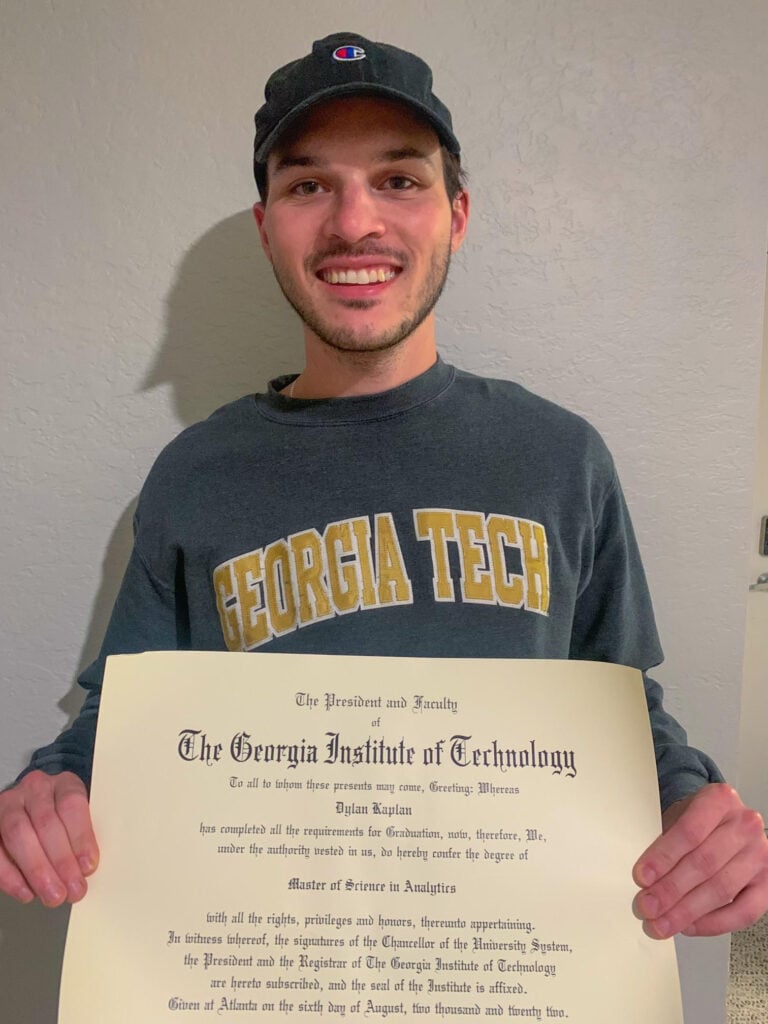
In this blog post, I’ll share my real experiences with the program – both the good and the bad.
While there is a ton more below, the tdlr is that Georgia Tech’s Online Master’s of Analytics was career-changing and worth every penny I invested into that degree.
A Little About Me
I attended OMSA from 2020-2022, right after finishing my degree in industrial engineering from The University of Central Florida (I didn’t even take a break!!).
I applied while doing an internship program at a company called Lockheed Martin, where I was playing around with analytics and some coding.
I still remember getting that Georgia Tech acceptance email.
Read more about my background here .
Why I Went To Georgia Tech And Did A Masters In Analytics (OMSA)
There were three primary reasons I chose to attend Georgia Tech for my master’s in analytics.
Georgia Tech’s brand name carries a lot of weight in any STEM-related discipline, and data science and machine learning are no different.
When employers see that you’ve graduated from Georgia Tech, they know you’ve been rigorously trained by some of the best professors in the world.
Georgia Tech has strong industry and academic partnerships, and at the time of applying, I had yet to decide if I wanted to continue and get my Ph.D. (Spoiler: I decided not to get a Ph.D.).
Secondly, and this is probably one of the reasons you’re reading this, I had difficulty getting interviews for data science roles.
I had applied to HUNDREDS of jobs but wasn’t getting any bites.

I decided that a Masters’s degree would give me the extra boost I needed to stand out from the competition.
(I got an interview and job offer in my first semester at Georgia Tech).
Lastly, I only had a little money after graduating from college.
Georgia Tech’s relatively low tuition prices made it an affordable and obvious option for me.
My Experience At Georgia Tech Doing A Masters In Analytics
To break down my experiences, I’ll go over what I loved, what I thought could have been better, and what I didn’t like.
What I loved
The Freedom.
Seriously, with how the classes were set up, you could do your homework, tests, and lectures any time of the day.
Since everything is recorded and video-based, you do this masters when you want, on your time.
Being a night owl, this was great for me, as it allowed me to watch a couple of lectures before bed or take a test at 1:00 in the morning.
One of my biggest complaints during undergrad was attending a lecture (nobody wanted to participate in) at 8:00 AM!!

Secondly, you could pick multiple paths within the degree with different difficulty levels.
I did the computational data analytics path, which was known to be the hardest.
Finally, the school spirit and the pedigree of the other students.
There was just something inside Georgia Tech that was kind of… inspiring?
Being around some of the brightest minds motivated me every single day to be a bit better.
In nearly every lecture, professors spoke about how lucky everyone was to be here learning with some of the brightest minds in the world.
What Could Have Been Better
I often found the lecture materials to be outdated and not particularly helpful.
By the end of my degree, I relied heavily on YouTube for educational content.

It can be challenging to keep up with the latest trends in any field, but it would have been helpful if the lectures had been more current and less math-heavy.
Many lectures felt slightly dry and unengaging.
It would have helped if some of the classes were more code based instead of power points.
Overall, I wasn’t thrilled with the quality of the lecture materials and found myself turning to other sources for information most of the time.
What I Disliked
When I started at Georgia Tech, I was excited to learn about the different theories and concepts behind analytics and data science.
While they hammered those topics (to the ground), I quickly realized there needed more emphasis on practical applications .
For example, we spent a lot of time learning about algorithms and statistical applications but only a little time implementing them.
As a result, when working as a full-time data scientist , there needed to be more clarity between what I learned and what I was doing.
Also, I was surprised that there wasn’t more emphasis on MLOPS and data pipelines .
These are essential skills for many analytical jobs, but they were barely mentioned in my classes.
Overall, I loved learning at Georgia Tech, but I wish there had been more focus on practical applications and MLOPS (Machine Learning Operations).
Why I Picked OMSA over OMSCS at Georgia Tech
I picked OMSA over OMSCS (Online Masters of Computer Science) because… I made the wrong choice.
While everything worked out, the analytics degree lacked computing fundamentals, which are the core of most higher-end data science and machine learning jobs.
The market agrees; OMSA’s graduation salary in 2021 was around $103,835 ( Source ), while OMSCS has a 2021 median salary of about $120,000+.

If I could go back, I’d choose OMSCS over OMSA, as my goal was to be a machine learning engineer emphasizing production infrastructure.
I just self-taught myself servers and MLOPS, and I’m doing fine today.
If my end goal was to work purely in statistics as a data scientist or data analyst, I think the analytics master’s would have been perfect.
Is Georgia Tech’s Online Masters In Analytics Worth Your Time And Money?
Georgia Techs Online Masters In Analytics Is worth every single penny I spent.
Not only did it give me a career change after just one semester, but it also elevated my career to new heights.
I did the program while working full-time, taking two classes a semester and finishing in two years.

The degree paid off way before graduation, and with a $10,000 price tag (that your employer will probably pay for), I wonder why everyone isn’t trying to get in.
Tips For Starting Georgia Techs Online Masters In Analytics
- Join the slack group.
- Go to office hours if you don’t understand concepts (or use YouTube).
- Code everything in Python and Javascript, ignoring other languages.
- Extend code from projects (like a web app) for pseudo work experience (put on resume).
- Don’t take simulation or the database class over the summer……
- Take two classes a semester. Yes, it’s a lot of work, and yes, it’s worth it.
My Stats When Applying To Georgia Tech Online Master in Analytics
- 3.5 Industrial Engineering GPA
- 2 Year Co-Op at Fortune 500 Company
Yeah, that’s it.
I was in my final semester of undergrad when I was applying, so all I had was my internship and my GPA.
Luckily, Georgia Tech decided to give me a chance, and I didn’t waste it.
- Recent Posts
- How much does a software engineer make at Gecko Robotics? [Top Salary Negotiation Tips] - December 22, 2024
- How Much Are Software Engineers at Google Paid? [Discover Their Salary Secrets] - December 22, 2024
- The Best Software for Garden Designers Revealed [Must-Have Tools] - December 22, 2024
Leave a Reply
Your email address will not be published. Required fields are marked *
Add Comment *
Post Comment
Master of Science in Analytics
An interdisciplinary hybrid data science and analytics degree.
Reports & Statistics
2024 Student Body Statistics
- 94 incoming students

Demographics
- 58% male, 42% female
- 63% US Citizens/PR, 37% international
- Belarus, Brazil, Canada, China, Hong Kong, Indonesia, India, Iran, Ireland, Israel, Lebanon, Nigeria, Pakistan, Poland, Singapore, South Korea, Spain, Thailand, Taiwan, United Kingdom, United States
Academic Backgrounds
- 40% CS/Data Science/Statistics/ML/AI
- 36% Engineering
- 24% Business
- 20% Finance/Economics
- 17% Math/OR
- 13% Science/Medicine
- 7% Social Sciences/Policy
- 5% Languages
- 3% Other (Arts, Law, etc.)
Totaling more than 100% due to candidates in multiple categories.
Work Experience
- Mean 2 years work experience
- 13% have a graduate degree
- 51% have experience, 49% do not
2023 Employment Statistics
Job-Seeking Graduates received full-time offers
Range in Base Salary
Average Base Salary
of placed students accepted jobs in the US

This is a partial list of companies.
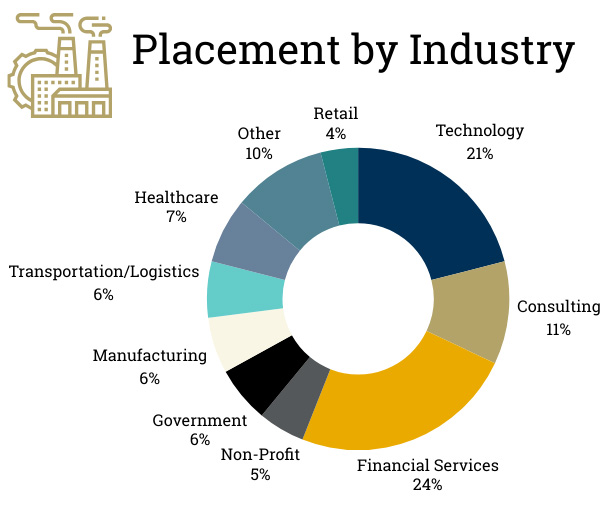
2023 Student Body Statistics
- 101 students
- 61 male (60%) and 40 female (40%)
- 55 US Citizens/PR (54%), 46 international (46%)
- 42% Engineering
- 24% Math/Statistics/OR
- 22% Computer Science
- 20% Business
- 18% Economics
- 11% Science/Medicine
- 10% Data Science/Analytics
- 6% Policy/Law/Government
- 6% Social Sciences/Religion
- 1% Fine/Performing Arts
- 56 have work experience (55%)
- 45 with no experience (except co-op/internship) (45%)
Academic History
- 17% have Master's/PhD
2022 Employment Statistics
of job seeking MSA 2022s accepted offers in the US
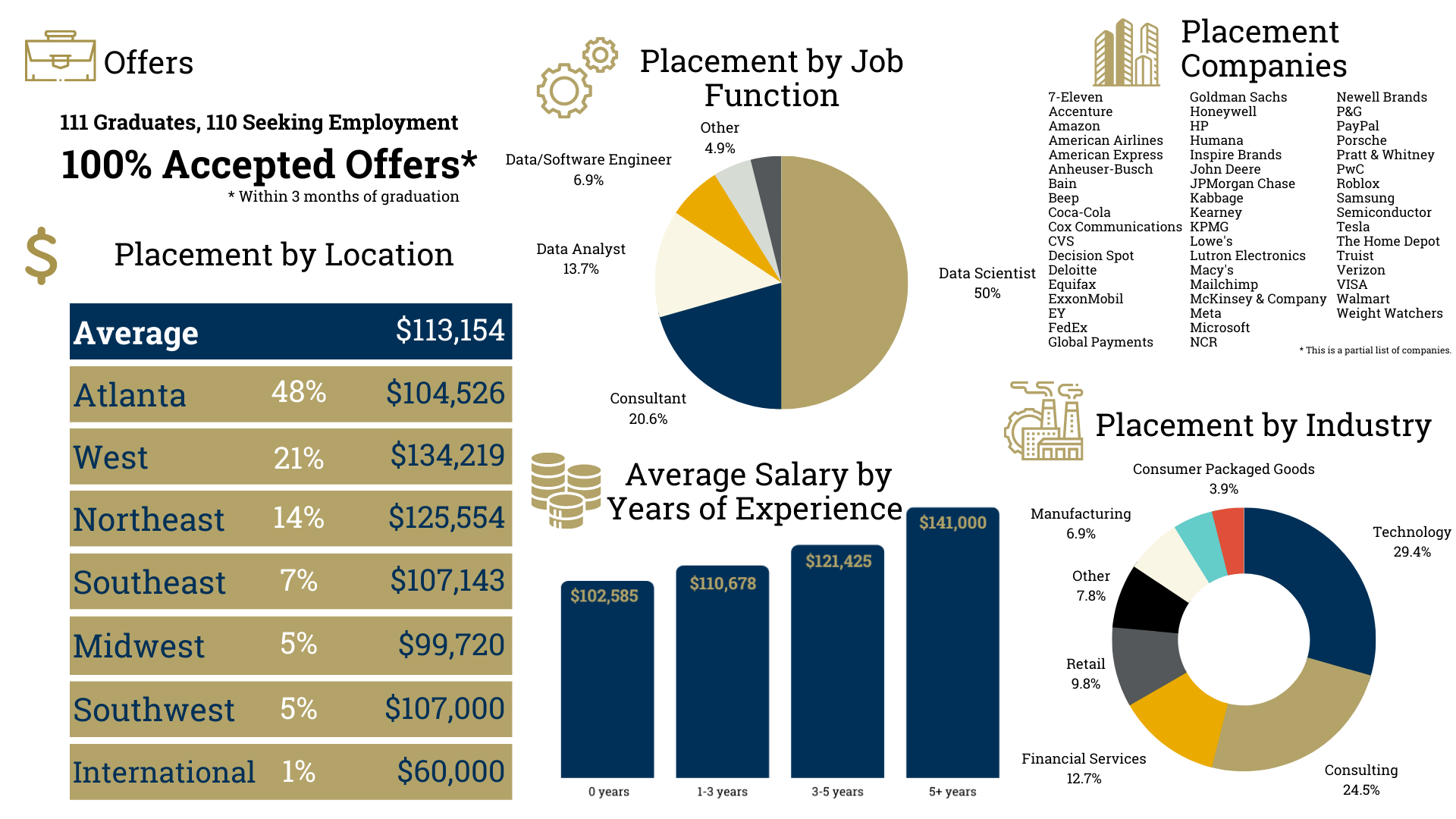
2022 Student Body Statistics
- 112 students
- 76 male (68%) and 36 female (32%)
- 52 US Citizens/PR (46%), 60 international (54%) - from 19 non-US countries
- 49% Engineering
- 46% Business/Economics/Finance
- 33% Math/Statistics/OR/Data Science/Analytics
- 15% Computer Science
- 8% Social Sciences
- 3% Public Health/Policy
- 3% Education
- 3% Languages/Communication
- Median = 1.5 years
- 60 have work experience
- 52 with no work experience (except co-op/internship)
- 16 already have MS, MA, MBA or PhD
2021 Employment Statistics
Job-Seeking MSA 2021s accepted offers in the US
Accepted offers were data science functions
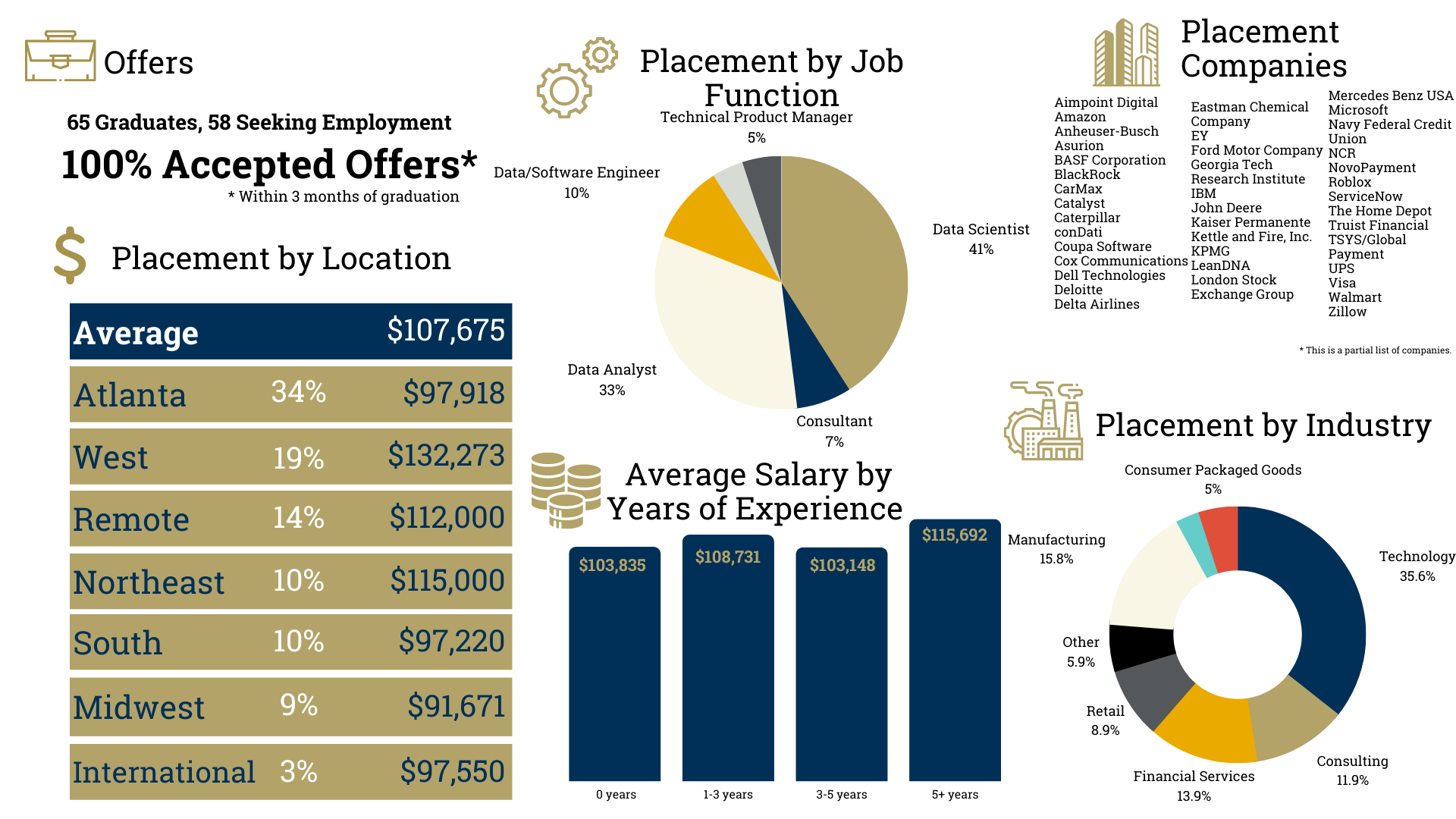
2021 Student Body Statistics
- 116 students
- 88 male (75%) and 28 female (25%)
- 57 US Citizens/PR (49%), 59 international (51%) - from 25 non-US countries
- 39% Engineering
- 38% Business/Economics/Finance
- 31% Math/Statistics/OR
- 13% Computer Science
- 9% Social Sciences
- 3% Languages/Writing
- 2% Professional (Law, Medicine, Pharmacy, etc.)
- 70 have work experience
- 46 with no work experience (except co-op/internship)
- 20 already have MS, MA, MBA or PhD
2020 Employment Statistics
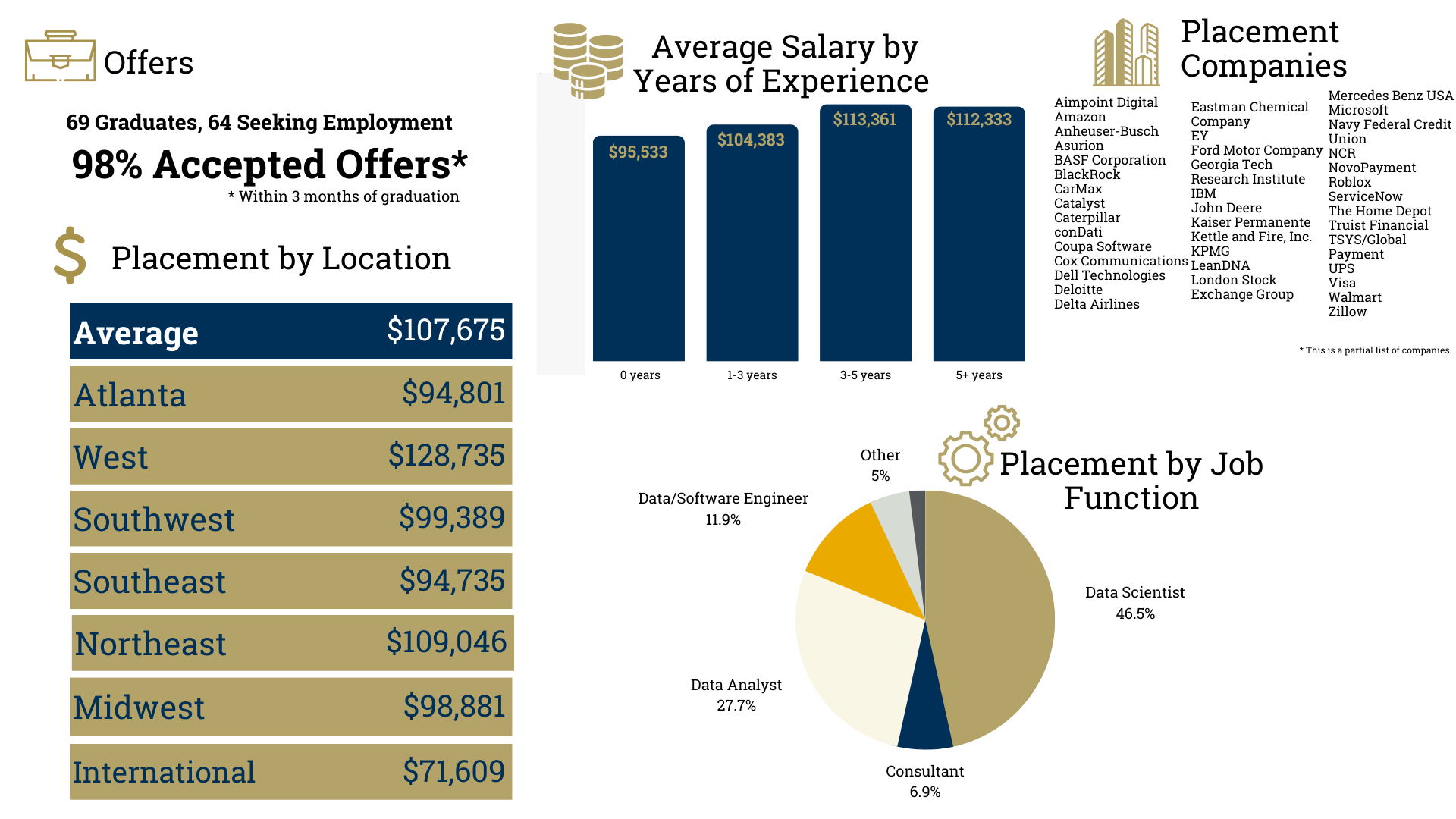
2020 Student Body Statistics
- 74 students
- 51 male (69%) and 23 female (31%)
- 42 US Citizens/PR (57%), 32 international (43%)
- 33% Engineering
- 20% Business/Economics/Finance
- 11% Math/Statistics/OR
- 4% Physical Sciences
- 4% Public Policy/International Affairs
- 1% Fine and Performing Arts
- Median = 1 years
- 38(51%) have work experience
- 36 (49%) no work experience (except co-op/internship)
- 27 already have MS, MA, MBA or PhD
- Skip to primary navigation
- Skip to main content
James Kerti
JamesKerti.com

Why I joined and left OMSCS at Georgia Tech
August 2, 2019 By James Kerti
Note added 2 August 2019
Two years ago I published this rather long post describing my experience in the OMSCS program at Georgia Tech. As I wrote it on my personal blog, which has few regular readers, I did not anticipate that one day this post would show up on the first page of Google searches for OMSCS.
I’m leaving this post up but I want to be clear that it reflects my personal experience in the program more than two years ago.
While I left due to OMSCS not being the right fit for me, I would in general recommend the program to someone looking to further their career and computer science education.
I spent the recent fall and spring semesters enrolled in the Online Master of Science, Computer Science (OMSCS) program at Georgia Tech . I decided near the end of the second semester that the program and I weren’t the right fit for one another.
I made the decision to withdraw.
I hope to provide some helpful information for anyone considering the program and wondering whether it fits their goals. Before I get into discussing that decision and the program in general, I want to share a little more about my background in this area.
I graduated from Villanova University in 2009 with a Bachelor’s degree in Computer Science. I found employment at a few software jobs before and after graduation. For the last several years, I worked as a freelance web developer.
My interest and background in sports pushed me in the direction of research and analysis. Some exposure to the world of data science made me realize I had real interest in studying it.
After teaching myself some of the basics using books and online resources, I felt like a more formal education in the subject could be quite valuable — both as a tool for structured, accelerated learning and for the sake of having the credential.
During my research I came across the OMSCS program, which seemed like a dream come true.
Roughly $7,000 for a genuine Master’s degree.
Learn from the real professors and university resources at one of the top computer science schools in the country.
Get in on the cutting edge of something refreshing and forward-thinking in education.
So I applied. And I got in.
(One thing I want to reflect on real quick — when I enrolled in undergrad at Villanova, I was an 18-year-old who was doing what he thought he was supposed to do — go to college, get the piece of paper. The education part of it didn’t linger much in my mind. I reversed my priorities this time around. Learning mattered more to me than the credential.)
Before I talk about my experience as a student, I want to say a couple things about my feelings toward the program in general after having left it:
- I really appreciate what they’re trying to do. The partnership with Udacity represents a step forward for education in general. Their effort to make the program affordable also goes a long way to opening up opportunities for people to learn and advance their careers.
- The professors are the real deal. I didn’t feel like there was any downgrade in instructor expertise compared to in-person classes.
- I feel grateful I enrolled. I performed well academically, “met” interesting people, and had a positive experience overall. More on this near the end.
I also want to make it clear that I can only share my personal experience here. I only enrolled for two semesters. Other courses might be different. Your mileage with the program may vary.
The basic structure works like this.
1) Udacity hosts the standard lecture videos for the class. Lectures often include (ungraded) quiz questions throughout to encourage you to pay attention and understand the material as you watch the lecture. (You can actually watch these lectures without enrolling. Go ahead and sample them yourself to get an idea of what to expect.)
2) Piazza serves as the online discussion board for the class. The students, TAs, and instructor use it as a primary tool for communication regarding questions and assignments.
3) T-Square hosts assignment instructions and other downloadable resources, usually PDFs. It also serves as a portal for submitting your work.
4) Exams are proctored using ProctorTrack. Basically you set up a webcam and microphone in a quiet space. You have a specified amount of time — 90 minutes, two hours, etc. — to complete the exam during what usually amounts to a three-day Friday through Sunday window. Any time during those three days, you can choose to sit down and take your exam. It’s like an in-person exam otherwise — don’t talk, don’t get up, don’t look around like you’re trying to cheat.
5) Most things happen on a weekly basis. Students have lectures to watch, material to read, homework to do each week. The exact days and times during the week they choose to do those things is up to them. Aside from scheduled optional office hours, there’s no need to be anywhere at a specific time. It works pretty well around your schedule.
That structure works fine. While some students occasionally shared problems they had with the software, I never had any issues.
(I’ll concede that experiencing software issues while trying to take an exam must be really stressful. There were some meltdowns and freakouts on the discussion board. I feel grateful to not have encountered any issues myself.)
While the software and basic structure worked pretty well, some challenges came up pretty consistently across the courses I took.
The pre-recorded nature of the lectures gives them the advantage of polish and convenient access for the students. No need to be in classroom at a particular day or time. Go through them at your own pace. Good things.
However, in the classes I took, the lectures were created by someone other than the current instructor. This disconnect brought a couple challenges.
The current instructor had his own perspective about what he wanted to cover in the course — and in what order to present. Instead of going through the lectures in the order in which they appeared in Udacity, students went through them in a different order that fit the current instructor’s plans for the curriculum.
Sometimes it caused confusion. It became more difficult to track our weekly schedule. Covering pre-recorded material in a different order than its creator intended left gaps in understanding.
One instructor created additional supplemental content which he posted on YouTube to cover things not in the original lectures. While this content provided extra value, it also obscured what we were expected to be watching and learning each week.
The situation also meant the current instructor lacked the level of intimate familiarity with the lectures (and included quizzes) that the original creator surely had.
It sometimes meant the instructor expected us to use a specific method or go about solving a problem in a particular way that differed from what the lecture creator presented. This disconnect caused confusion and miscommunications and created extra work for everyone involved.
Miscommmunication and confusion.
I felt like those two characteristics appeared among the most consistent themes of the program for me.
It felt like students frequently lost important information in translation on the online discussion board compared to what could have been more easily communicated and clarified in-person. The highly technical nature of the computer science material surely contributed.
Teaching assistants and instructors frequently answered student questions on the discussion board in ways that failed to provide the necessary amount of clarity.
Sometimes their responses even caused more confusion than previously existed.
I could share several stories, but one incident sticks with me most.
A student asked a question about a challenging homework problem we faced.
She wanted to know what level of detail the instructor expected us to go into in solving a problem. Did we have to do the entire thing by hand in great detail, or was using a shorter, known method we learned in the lecture sufficient?
This question represented a big deal because solving the problem by hand involved using fairly advanced calculus many students had not taken in years (or at all). Furthermore, this class did not list such calculus as a prerequisite.
(I’ll note at this point that this type of situation became very common in this class. Vaguely worded assignments left students guessing. The instructor, for reasons I did not understand, did not engage with students in addressing these concerns, instead opting to let students figure it out for themselves, docking points after the fact if students didn’t read the instructor’s mind.)
A TA responded that no, students could not use the shorter method and must use the calculus.
Meanwhile, the instructor himself remained silent.
Cue a panic as students started desperately trying to learn the necessary calculus while figuring out how to do the rest of the assignment.
The instructor then appeared in an office hours session three days later to say that no, in fact the rigorous method involving the calculus was not necessary, and the shorter version would be perfectly sufficient.
But then … oh no.
A few days later, in his weekly update on the discussion board, the instructor acknowledged the confusion and asserted that — yes — in fact the rigorous version involving the calculus would be necessary.
This 360-degree circle of confusion spread over an entire week spent trying to simply understand in what way to answer the first question, on whose solution the other five questions depended.
This story offers one of the more extreme but representative examples of the type of miscommunication that plagued the classes I took.
I often felt like I spent vastly more time trying to resolve these gaps in communication than actually learning the material. I found this balance to be incredibly frustrating at times.
Because I never had an experience like this one in my in-person undergraduate and graduate studies at Villanova, I can’t help but wonder if the frequency and magnitude of these challenges uniquely exists in an online program
Now I’ll repeat what I said earlier about my intention in joining OMSCS:
“I felt like a more formal education in the subject could be quite valuable, both as a tool for structured, accelerated learning and for the sake of having the credential.”
It seemed to me that I spent a fairly small portion of my weekly education time and energy on learning the content through the provided materials.
Instead, I spent the bulk of my time trying to:
1) Do extra learning on my own, hunting down other resources, to resolve gaps and incongruencies between the original created lecture material and the current instructor’s expectations. At times I watched several hours of video on YouTube and non-OMSCS MOOCs to clarify outstanding questions about four minutes of an OMSCS lecture I watched.
2) Resolve communication difficulties so I could make sure I learned the right things and completed assignments properly.
I felt like too much of a disappointing gap existed between the progress I made in learning the material and the speed at which I hoped to learn.
So I decided to leave the program because we weren’t the right fit for one another.
I’ve been continuing to do a lot of independent learning on my own. I feel like I’m learning more efficiently and effectively in this way.
As someone who’s already been working as a freelancer for several years, the credential doesn’t mean as much to me as it might to someone else.
The program probably is a good fit for someone who:
1) Feels more comfortable learning in an environment that provides a structured curriculum with an instructor.
2) Craves an introduction to interesting ideas and material in computer science to which they might not otherwise have an encounter.
3) Recognizes that earning the degree would bring a lot of extra value to their career.
I hope this post provides some value and guidance to someone exploring the program and wondering whether it is the right fit for him or her.
If you have any questions, please feel free to email me .
Digital strategist and systems specialist, poet, former basketball scout, technically a politician.
Reader Interactions
November 22, 2018 at 7:10 am
Thanks for your post. It provides me with quite a lot information about this program.
I am living in China and graduated from Chinese top university with major in Mechanical Engineering. Despite my major, I have been working as a server software engineer for near three years at Tencent. I am trying to know more about this program, your post truly helps.
December 11, 2018 at 10:31 am
Hello James,
It sounds like the class you had difficulty with was Data Visualization and Analytics (DVA). I was in the class that same semester. It was easily the worst class I took in the program, and I ended up withdrawing from it. I am sorry you had to endure that.
I can assure you that the vast majority of the classes are handled much better than DVA (with some exceptions). I’m about to graduate this month, and I am very pleased with the quality of 9/10 of the courses that I completed.
December 11, 2018 at 12:05 pm
You are correct. No, it did not make for a good experience.
I’m glad to hear your experience on the whole was better. Congrats on being on the verge of graduating!
May 6, 2019 at 3:29 am
Great post James! Appreciate the time you have taken to write this!
July 4, 2019 at 7:56 pm
Thank you James Kreti. This post is a great help to me.
August 1, 2019 at 12:13 pm
Just a quick update two years on for anyone curious: this course was actually completely re-done from scratch not long after that semester, based in part on the feedback we received.
-David, person who works on the program 🙂
August 5, 2019 at 4:35 am
Prof. Jonyer, I really love how you take care of such details and try to answer all posta
and to share my experience I took 2 courses till now and they were very good (other than some small technical issues in the 2nd course)
overall I think such program gives us the chance to get a degree also learn the right way
so for me its better than MOOCs and Online courses ..etc (I also take alot of online courses) and i actually do think online courses are very good thing, but they are not as good as having someone in person to guide you
October 17, 2019 at 7:51 pm
Wow, I like your course for the Python!
October 11, 2019 at 8:00 pm
I am sorry to hear about your bad experience. Your feedback made the class better! So, thank you for the feedback!
I took the remade DVA by Dr. David Joyner and loved it. I learned the derivation of logistic regression. The calculus bit wasn’t too bad. I graduated from GT and had good experience with 1o of the classes I took (Most of the classes I took were related to ML/AI and Computational Perception).
I am happy you found a better learning method. I wish you all the best in your continuing learning!
February 22, 2020 at 4:24 am
I also quit the program. Before starting the program, I wrote a personal plan about what classes I would like to take. In my first semester, I got the class I wanted which was Computational Photography. In my second semester, NONE of the classes that I wanted were available. I started panicking: ALL the classes available were not in my plan. It had only “Advanced …”, or classes that I’ve never heard about before. I was waitlisted to one class that I would love to take and my position was #836 lol. End of story: I did not take this class. So, I took one class that I would be more familiar with… KBAI. I know it has the word AI, but not related to AI you saw in undergrad. I know It’s my fault, but when I’m not interested in something, I don’t put effort into it. I feel it’s a waste of time, energy, etc. I work fulltime and I really enjoy my job. Every time I was home, I was feeling very tired just to think of this class. So, I decided to quit.
March 20, 2020 at 12:14 pm
Like some here, I spent a lot of time doing extra learning on my own in order to complete homework and assignments because the course material was insufficient. Some courses were a normal graduate workload of about 3-4 hours per week per credit. Others were ridiculous 20-30 hours per week for 1 class. I couldn’t take it anymore and I quit the program after 5 of 10 courses. I have a full time job and kids who missed their mom. I gained 30 pounds from the stress and sitting still. I really wish I could have finished. It bothers me to not finish. I also experienced big problems getting the classes I wanted. KBAI was a total waste of time and was the straw that broke this camel’s back.
May 5, 2020 at 3:49 am
Fun. There are probably 4-5 courses in the program that are not available after you’ve taken 1 class. You either (a) missed your time ticket for registering, (b) cannot endure sitting some time on the wait list, (c) had severe misunderstanding about how the system works. Either way, it’s hard to blame the program for that. P.S. KBAI is a trash course though, I agree.
July 1, 2020 at 3:02 pm
I just finished my first semester at GT, and I was in the wait list. I din’t get in until 2 days before register end. OMG!! After finished my semester I was feel very tired want to take a break. A lot of work load but fun with my team work. I hope I able to get in to class that my list on my second semester.
June 4, 2020 at 6:53 am
James, Thank you, thank you, thank you for keeping this post up! While I have been battling the Georgia Tech administration for the past 20 months to be able to continue in OMSCS, it has been infinitely reassuring to see that there’s at least one other poor slob out there who couldn’t read the TA’s mind.
You were wise to get out after two semesters. I stayed in for 5 semesters, until they finally succeeded in kicking me out over an exam issue that was not my fault.
My blog is coming next. I don’t have the URL yet, but the title will be: “One Woman’s Nightmare in the Georgia Tech OMSCS Program” Please keep an eye out for it!
June 26, 2020 at 2:59 pm
Some TA’s are really good but some are mediocre and its really hard to get the problems regraded even though we gave them right answers. I chose and left the program only because of poor grading structure and huge class sizes becomes impossible for professors to respond in timely manner. If we lose a point , TA is clue less and there is no way to talk to professors or head TA. If we argue there is a way our work will be flagged and i feel this is a key aspect in grading assignments and will be left out at their mercy. I feel in general its ook but there needs lot of improvement on grading and providing efficient feedback .
June 30, 2020 at 9:12 am
I am into my second semester of CS and I am convinced OMS is just a money factory for GATech and little to no academic oversight.
James I will say that the professors or teachers so far are non existent.. On two classes by W Lee not once he has responded to students with anything meaningful. You many know or be an expert on a particular subject, but that does not make you a teacher or professor!
TA’s here are the “professors here, they run the class and bully everyone. The current CS-6262 is the worse class I have seen in my life. The projects are poorly written, have errors, omissions and TA’s (Muktar) response it to ask in Piazza. Why can the fix the damn documentation?
Being a networking class, it is heavily loaded into web development and it should not be the case. There is a world out there for network security and chasing a malware/bots is not something exotic or that I can use at work today.
I am a paying student and should not have to ask or beg to get the proper documentation, references and resources for a project.
Everyone has personal experiences and opinions so for me personally, I did not join GATech to buy a masters for $9K or needed to “fuel” my career and make more money.
I get paid pretty darn well and this degree will not make a dime of difference. Instead, I expected to learn something for myself and be treated professionally. I have to say I am really disappointed.
Anyone reading https://omscentral.com reviews?
I am giving it a try for one more semester, but if this continues I will drop too.
September 8, 2020 at 6:52 am
This was quite insightful. Really appreciate it! As a matter of fact I was thinking to enroll to this course nay program. One thing I am worried about is when people in the comments saying that they did not get their preferred course, is there anyway to prevent this?
November 20, 2020 at 7:06 pm
I’m with you there. Coming from WGU that was never an issue. I don’t want to take courses because I have no other choice aside from wasting time until I can take the ones that are of interest; or worse, that must be taken.
September 13, 2020 at 11:26 pm
Was Just accepted to the OMSCS. Slightly concerned reading these posts. I have a CS undergrad and engineering undergrad but have been away from programing and calculus for over 20 years. Worked in Energy Engineering (power plants) not programming. Starting in jan and I am considering taking a C or C++ online class in coursera or jetbrians now to at least prep for coding have not taken a C programming class in over 20 years. If I accept the offer definitely doing one class at a time to minimize the difficulties and challenges here. I work full time but flexible schedule have the 20 hours a week to dedicate. Any thoughts?
September 14, 2020 at 8:36 am
I wrote this post years ago. I wouldn’t suggest it’s currently an accurate assessment of what to expect in the program. That being said, trying one class to start with sounds prudent if you’re working full-time and want to get settled in.
February 2, 2021 at 2:51 pm
No it’s quite accurate. And I would say it’s gotten worst. The course are TA driven and the head instructor is a former graduate of OMCS. Yes, the “canned” course on Udacity are Professors, but courses are now heavily led by and polices are set by former OMCS graduates. Disorganization and poor communication are still true. But most troublesome is the hypervigilance on student’s cheating. It is so intense that students don’t even want to talk to each other about ANYTHING. And these OMCS graduate instructors make no bones about communicating that someone was “caught”. It is used to further intimidate. There is no way they are this vigilant to students on campus. This will most likely be my last semester.
January 24, 2021 at 5:38 pm
Most courses are in python. I had not done any python before I started. Learned along the way. You’ll be ok, especially if you can devote 20 hours a week. Would recommend doing only one course a semester. Good for your confidence and will get you into it. I’m working on my 9th course now.
September 19, 2020 at 7:03 am
Thanks for your candidness. Villanova grad here as well, mathematics. I wasn’t as successful as you careerwise with math having very little practical application to the working world. I’ve been trapped at the bottom of the world of administration in the finance industry, lacking whatever personality trait is needed to climb the corporate business ladder. In hopes of moving to the more technical side of things where I belong, I enrolled in the CIS/Data Analytics program at BU. I attend on campus and the structure is very similar to what you described here. The core classes have tests made by the university which are checked by a computer, the instructors have no idea what is on the test, they lecture material they would like you to learn, and the TA’s grade the homework and are the only people you can reach out to for help. This is not the case for some of the electives, but in some classes they pretty much throw a book at you to teach yourself. I’m wondering if this is the overall mentality for graduate school where you aren’t expected to be spoon fed, or just the format for bigger universities in general. I have tuition reimbursement and was looking to do the OMSCS or OMSA after my current program to keep my skills sharp, it’s good to know to expect more of the same.
February 2, 2021 at 2:53 pm
You probably will not find a OMSCS program for $10,000 any where. It’s dirt cheap. But if you can find a way to work for a company and have them pay for your studies, you are much better off w/ traditional campus program or a hybrid program.
May 1, 2021 at 8:54 am
I know this article is a few years old but I wanted to ask if students in the online program could pursue research opportunities/write a research thesis?
That’s one of my chief priorities in pursuing a Master’s degree, as I want to use it to obtain research experience that I could use to get into a PhD program, as I currently lack any.
May 19, 2021 at 5:36 am
I was an undergraduate in the College of Engineering studying computer engineering at Georgia Tech from Fall 2020 – Spring 2021. Prior to GT, I had been to 7 higher-education institutions prior to GT; I moved a lot for work. GT was the only school where I had the hardest time connecting to a community and resources on campus for academic and professional enrichment and opportunities. I transferred to Cornell University and start there this upcoming Fall.
I’m not sure that Cornell will be better. I thought about applying to OMSCS program at GT, but if all of you are having the same problems I did during my undergrad at GT I think I better look elsewhere.
December 23, 2021 at 4:09 pm
I have completed 7 classes in the program. This is the OMSCS experience. It requires tons of self-learning and attention to detail. Almost all OMSCS classes offer high-level lectures and rigorous, graduate-level technical assignments. The real learning happens while grinding through the projects, which is consistent with Georgia Tech’s overall teaching philosophy.
At this scale, there’s definitely some overreliance on autograders and lack of grading flexibility. Minor issues with incorrect or ambiguous assignment instructions are, unfortunately, somewhat common. That’s the nature of school, especially online without synchronous opportunities to get clarifications. The good news is the unofficial online OMSCS communities have tons of information about the classes and literally hundreds of reviews, so you can easily avoid the problematic classes if you can’t tolerate some improvisation.
For posterity: a semester with 1 class currently costs $841, so a pace of 1 class per semester would be $8,410 total. The overall cost is slightly less for multiple classes in a semester.
June 1, 2022 at 1:27 am
I’ve earned two masters already.
Currently working on a doctorate degree.
I tried out the OMSCS to work toward a third master’s for one semester (a terrible idea and regrets for sure). They work as a business more or less than a Student’s self-interest to learn. There is no interface with the professor and seemed neglected, nor do they email you back. They do not promote interfacing with other students. You can easily get accused of false-positive or petty academic misconduct which can lead to an easy F or sanction from the OSI organization which is end-of-itself is very disorganized. I’ve read horror stories about these experiences. You will not be able to recover from this in graduate school. They do not replace grades but average them out.
Worst experience in my life after attending college for +10 years. I personally think it was a waste of time and money.
I don’t know how GT’s Computer Science is even ranked in the top tier. I believe it will get devalued over time due to the high quantity of MS CS degrees being handed out like candy at cheap prices. Plus the courses are self-taught by modules and typical exams that are proctored by a third party interface (they don’t want to do the work, but collect money like an education monopoly). Basically monopolizing off of their prestige and ranking. Not the greatest practice in my opinion. It felt like more of an undergraduate experience for me than anything else.
If I get asked if I would go back and attend GT OMSCS.
My answer is absolutely NOT.
To each their own experiences. And I expect professionalism and they did not offer that to me with basic standards.
August 3, 2022 at 12:58 pm
Some of these points are valid. Professor absenteeism happens in many classes. Thankfully, most of the TA teams have rock-solid leaders. The program does not provide direct professor interaction unless you seek out an independent project or research.
OSI violations are somewhat common but usually egregious. I say this as someone who has worked as a TA and talked to TAs from other classes. I haven’t heard any anecdotes of legitimate false-positive OSI violations. Unfortunately, aggressive plagiarism becomes a necessary evil when at least 1 cheating attempt is statistically inevitable in every class. The program has motivated a ton of plagiarism research at Georgia Tech.
“I don’t know how GT’s Computer Science is even ranked in the top tier. I believe it will get devalued over time due to the high quantity of MS CS degrees being handed out like candy at cheap prices.”
No evidence exists for this tired refrain based on foolish correlations: nobody is criticizing Berkeley with >1,300 CS graduates per year and nobody is praising University of Richmond’s >$200k CS degree. The US News ranking for the GT MSCS program has improved from #8 to #6 since OMSCS began.
OMSCS is a trailblazer, not a monopoly. UT Austin and UIUC host competing programs with similar objectives (fully online, discounted price, non-thesis). If you want something more exclusive and personalized, you could pay tens of thousands of dollars to the online programs at Johns Hopkins or Stanford for that privilege.
I understand you’re frustrated and the program wasn’t a good fit for you, but that doesn’t justify baseless accusations.
Leave a Reply Cancel reply
Your email address will not be published. Required fields are marked *

IMAGES
COMMENTS
I have about 3 years of data science experience. I am currently uninspired by work. I found some professors doing some interesting AI work at a local university where I could apply for a PhD program. However, I don’t want to take a pay cut or get too...
Feb 22, 2024 · I attended OMSA from 2020-2022, right after finishing my degree in industrial engineering from The University of Central Florida (I didn’t even take a break!!). I applied while doing an internship program at a company called Lockheed Martin, where I was playing around with analytics and some coding.
Dec 20, 2016 · Now I've retired from teaching, and am pursuing a PhD in computer science at UCSC with a focus in machine learning, thanks to the OMSCS program. I highly recommend the OMSCS program! :-) Like ...
16 already have MS, MA, MBA or PhD; 2021 Employment Statistics. 100%. Job-Seeking Graduates received full-time offers. 70 - 186K. Range in Base Salary . 107K+
Aug 2, 2019 · After teaching myself some of the basics using books and online resources, I felt like a more formal education in the subject could be quite valuable — both as a tool for structured, accelerated learning and for the sake of having the credential. During my research I came across the OMSCS program, which seemed like a dream come true.
Jun 29, 2020 · After researching programs for several weeks, I finally found what I was looking for. This analytics program had a price tag under $15,000, had flexibility in different specializations, and came from a reputable university. It was Georgia Tech’s recently formed Online Masters of Science in Analytics program (OMSA).
Dec 22, 2023 · After thorough research, I chose Georgia Tech's OMSCS, a pioneer in the field since 2014. A few thousand students had already graduated from the program when I started in 2021.
7. If your course was taken more than six years ago, you will be required to submit a Petition to the Faculty after receiving approval from the FAC. The Graduate Curriculum Committee (GCC) will need to review your petition. If the GCC approves, your advisor will send this to the Registrar’s Office for final Institute approval and processing.
Jan 15, 2019 · You likely earn more. It's not just for the next 3-5 years that you need for a PhD. If you do a PhD, after you graduate, you'll need to find a job. If you get a job now, you'll already have a job. If you do well you might even command a higher salary in 5 years' time compared to entering the market as a fresh PhD. You might find you don't need ...
Anyone pursued a PhD after completing this program? : r/OMSA In the end, a PhD is really my goal. I'd like to find out if anyone has gone on from this masters program into the school's (or any other school's) PhD program.